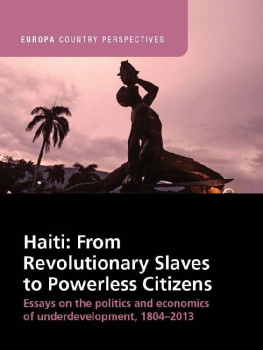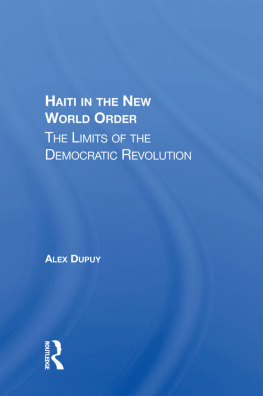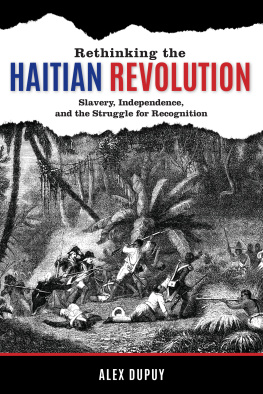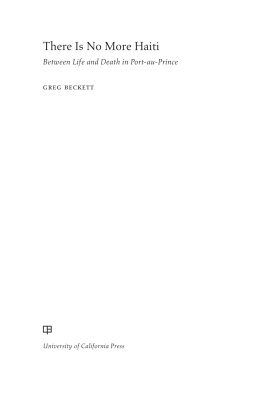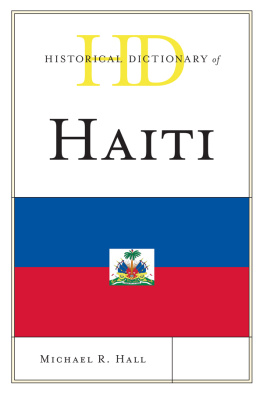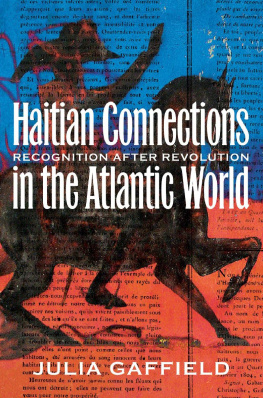Haiti: From Revolutionary Slaves to Powerless Citizens
This title focuses on Haiti from an international perspective. Haiti has endured undue influence from successive French and US governments; its fragile democracy has been founded on subordination to and dominance of foreign powers. This book examines Haitis position within the global economic and political order, and how the more dominant members of the international community have, in varying ways, exploited the country over the last 200 years.
Alex Dupuy is John E. Andrus Professor of Sociology at Wesleyan University in Middletown, CT, USA.
Europa Country Perspectives
The new Europa Country Perspectives series, from Routledge, examines a wide range of contemporary political, economic, developmental and social issues from areas around the world. Complementing the Europa Regional Surveys of the World series, Europa Country Perspectives will be a valuable resource for academics, students, researchers, policy-makers, business people and anyone with an interest in current world affairs.
While the Europa World Year Book and its associated Regional Surveys inform on and analyse contemporary economic, political and social developments at the national and regional level, Country Perspectives provide in-depth, country-specific volumes written or edited by specialists in their field, delving into a countrys particular situation. Volumes in the series are not constrained by any particular template, but may explore a countrys recent political, economic, international relations, social, defence, or other issues in order to increase understanding.
Haiti: From Revolutionary Slaves to Powerless Citizens
Essays on the politics and economics of underdevelopment, 18042013 Alex Dupuy
Haiti: From Revolutionary Slaves to Powerless Citizens
Essays on the politics and economics of underdevelopment, 18042013
Alex Dupuy

First edition published 2014
by Routledge
2 Park Square, Milton Park, Abingdon, Oxon OX14 4RN
and by Routledge
711 Third Avenue, New York, NY 10017
Routledge is an imprint of the Taylor & Francis Group, an informa business
2014 Alex Dupuy
The right of Alex Dupuy to be identified as the author of this work has been asserted by him in accordance with the Copyright, Designs and Patents Act 1988.
All rights reserved. No part of this book may be reprinted or reproduced or utilised in any form or by any electronic, mechanical, or other means, now known or hereafter invented, including photocopying and recording, or in any information storage or retrieval system, without permission in writing from the publishers.
Trademark notice: Product or corporate names may be trademarks or registered trademarks, and are used only for identification and explanation without intent to infringe.
British Library Cataloguing in Publication Data
A catalogue record for this book is available from the British Library
Library of Congress Cataloging in Publication Data
Haiti, from revolutionary slaves to powerless citizens : essays on the politics and economics of underdevelopment, 1804-2013 / Alex Dupuy.
pages cm. (Europa country perspectives)
Summary: This title focuses on Haiti from an international perspective. Haiti has endured undue influence from successive French and US governments; its fragile democracy has been founded on subordination to and dominance of foreign powers. This book examines Haitis position within the global economic and political order, and how the more dominant members of the international community have, in varying ways, exploited the country over the last 200 years Provided by publisher.
Includes bibliographical references and index.
1. HaitiPolitics and government. 2. HaitiForeign relations. 3. HaitiEconomic conditions. 4. Economic developmentHaiti. 5. DemocracyHaitiHistory. 6. Failed statesHaiti. I. Title.
F1921.D87 2014
972.94dc23
2013040547
ISBN: 978-1-85743-710-2 (hbk)
ISBN: 978-0-31585-654-4 (ebk)
Typeset in Times New Roman
by Taylor & Francis Books
Editor, South America, Central America and the Caribbean: Jackie West
Editorial Assistants: Amy Welmers, Lydia de Cruz
Contents
First and foremost I want to express my most profound gratitute and indebtedness to Franck Laraque for his mentorship and all he has taught me over the past forty some years. No one has inspired me more than he to never give up hope and the belief that a more just and egalitarian future is possible. I am immensely grateful to Leslie Demangles for his careful reading of all the essays in this book and for his most helpful editorial comments and suggestions. I would also like to thank Robert Fatton for his comments on . I also want to thank my friends and colleagues Robert Fatton, Leslie Desmangles, Robert Maguire, Carolle Charles, Franois Pierre-Louis, Henry Chip Carey, Linden Lewis, Hilbourne Watson, Anton Allahar, and Brian Meeks. The stimulating discussions we have had and the many panels we have shared at the annual meetings of the Haitian Studies Association and/or the Caribbean Studies Association have influenced my thinking on the issues I deal with in this book.
Last but not least, I want to thank the editorial and production staff at Routledge especially Jackie West, Editor, South America, Central America and the Caribbean, Europa Country Perspective Series; Kris Wischenkmper, Copy Editor; Paola Celli, Senior eProduction Editor; and Tom Hussey, Book Cover Designer.
The transition to democracy and the demise of color politics in Haiti is a revised version of the article: From Franois Duvalier to Jean-Bertrand Aristide: The Declining Significance of Color Politics in Haiti, in Kate Quinn and Paul Sutton, eds. Politics and Power in Haiti, 4363. New York: Palgrave Macmillan, 2013. Reprinted with permission from Palgrave Macmillan.
The World Bank and Haiti: abetting dictatorship, undermining democracy is a revised version of the article Globalization, the World Bank, and the Haitian Economy, in Franklin W. Knight and Teresita Martinez-Vergne, Contemporary Caribbean Cultures in a Global Context, 4370. Chapel Hill: The University of North Carolina Press, 2005. Reprinted with permission from The University of North Carolina Press.
Class, power, sovereignty: Haiti before and after the earthquake is a revised version of the article Class, Power, Sovereignty: Haiti Before and After the Earthquake, in Linden Lewis, ed., Caribbean Sovereignty, Development and Democracy in an Age of Globalization, 1734. New York: Routledge, 2013. Reprinted with permission from Routledge.
AFL-CIO | American Federation of Labor-Congress of Industrial Organizations |
ALBA | Alianza Bolivariana para los Pueblos de Nuestra Amrica (Bolivarian Alliance for the Americas) |
BNC | Banque Nationale de Crdit (National Bank of Credit) |
BPH | Banque Populaire Hatienne (Haitian Popular Bank) |
CARICOM | Caribbean Community |
CBTPA | Caribbean Basin Trade Partnership Act |
CD | Convergence Dmocratique (Democratic Convergence) |
CEP | Conseil lectoral Provisoire (Provisional Electoral Council) |
CEPR | Center for Economic and Policy Research |
CIA | Central Intelligence Agency |
Next page
